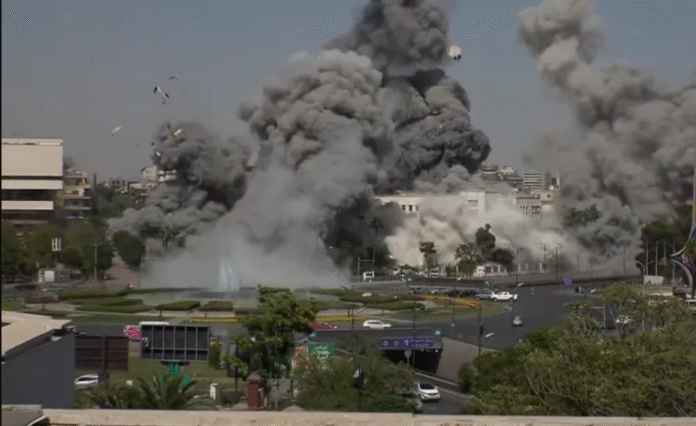Syria Stability Under Threat as Turkiye Accuses Israel and SDF of Destabilization
Syria stability under threat, that’s the strong message from Turkiye’s Foreign Minister Hakan Fidan, who delivered a sharp warning to both Israel and the Kurdish-led Syrian Democratic Forces (SDF) this week. Hosting Syrian Foreign Minister Asaad al-Shaibani in Ankara, Fidan accused both parties of deliberately undermining Syria’s fragile recovery after over a decade of war and political upheaval.
Speaking at a joint press conference on Wednesday, Fidan stated that Israel had “fuelled certain difficulties” in Syria and stressed that true security could never be achieved at the expense of neighboring countries’ stability.
“If you try to destabilise these countries, if you take steps to that end, this could trigger other crises in the region,” Fidan warned.
Al-Shaibani echoed these sentiments, accusing Israel of actions that “undermine the security of our citizens” and suggesting that some nations want Syria to fragment along ideological or ethnic lines, a scenario both leaders firmly oppose.

New Defence Pact Signals Closer Turkiye–Syria Cooperation
In a sign of shifting alliances, the defence ministers of Turkiye and Syria signed a memorandum of understanding on military training and consultancy in Ankara on Wednesday. The two nations have been in talks for months to formalize a broader military cooperation agreement following the ouster of Bashar al-Assad last December in a swift rebel offensive.
This closer partnership comes as Syria’s interim President Ahmed al-Sharaa struggles to manage internal unrest. A deadly clash erupted in the southern province of Suwayda in July between Bedouin and Druze fighters, prompting government forces to step in.
Israel’s Military Actions Escalate Tensions
The violence was further inflamed by Israeli air strikes on Syrian positions, including an attack on the capital Damascus, under the stated aim of protecting the Druze minority. Since Assad’s removal, Israel has regularly bombed Syrian targets and conducted ground operations, often claiming to target weapons facilities and labeling the new Syrian leadership as “extremists.”
External DoFollow source: Read more about Israel–Syria relations here.
SDF Clashes and an Uncertain Peace Deal
While tensions with Israel simmer, the Syrian government is also contending with persistent clashes with the SDF in Aleppo province. These battles threaten to unravel a March integration deal that aimed to reunify the fractured nation.
Under that agreement, the SDF was expected to merge into Syria’s armed forces, but disagreements remain. The SDF insists its fighters join as a unified bloc, while Damascus demands individual integration.
Despite the peace framework, hostilities continue. On Tuesday, the Syrian Defence Ministry demanded that the SDF cease attacks on government forces, warning of “new consequences” if the violence persisted.

Paris Talks Collapse Amid Rising Tensions
Plans for a meeting between Syrian officials and the SDF in Paris have collapsed. However, sources confirmed that a senior Kurdish administration official met with Syria’s foreign minister in Damascus just a day before the latest Aleppo clashes.
The SDF, once the primary US ally in the fight against ISIL (ISIS) in 2019, has accused government-backed militias of launching over 22 attacks in northeastern Syria in recent days. Although the group claims to have shown restraint, it warns that continued “aggressions” could shatter mutual trust.
Turkiye’s Hardline Stance on the SDF
Ankara views the SDF as a direct threat because it is dominated by the People’s Protection Units (YPG), which are affiliated with the Kurdistan Workers’ Party (PKK), a group that has fought Turkiye for over 40 years, causing more than 40,000 deaths.
Although the PKK is currently engaged in a peace process with Turkiye, the SDF has distanced itself from that deal. Fidan criticized the SDF leadership for trying to exploit Syria’s instability for political gain.
“The upper echelons of the YPG need to stop playing for time… the chaos they’re waiting for will not be to their advantage,” Fidan stated.
Regional Implications and the Road Ahead
The current geopolitical landscape in Syria suggests that stability remains elusive. With Syria stability under threat from both external strikes and internal divisions, Turkiye’s warnings may mark the start of a more assertive regional policy.
Whether the latest Turkiye–Syria defence pact can counterbalance the combined pressures from Israel and the SDF remains uncertain. Yet, with millions displaced, cities in ruins, and trust between factions in short supply, the path to a secure and unified Syria is fraught with challenges.

